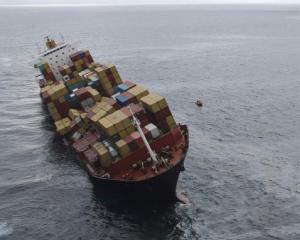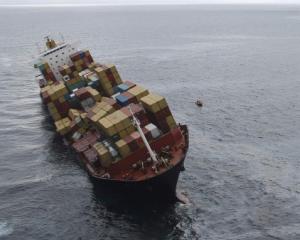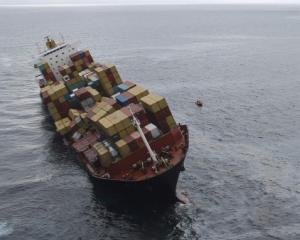A wildlife team has been scrambled to an offshore conservation haven feared to be in the path of the Rena's latest oil spill.
Up to 10 tonnes of oil that leaked from the ship overnight Saturday was predicted to move slowly offshore to the north, and could reach Tuhua Mayor Island, some 36km away, by Wednesday.
The spill comes at a time during which many marine bird species on the protected island are nesting or feeding chicks.
Aerial observation flights would today monitor the fresh spill and track its trajectory.
National on-scene commander Rob Service said on-water oil recovery operations yesterday recovered a small amount of the oil.
"We acted immediately upon receiving confirmation of the slick yesterday and sent four vessels with offshore booms and skimmers.''
But despite the relatively calm conditions yesterday, it had been very difficult to recover much oil.
"Now the oil has weathered in the marine environment for 24 hours it is even more difficult to recover with skimmers, but we will continue to monitor the oil and prepare to respond if it reaches any shoreline.''
A Maritime New Zealand spokeswoman said a wildlife team had been sent to Mayor Island today to assess what needed to be done.
"We've got a little bit of time to organise and that's why the wildlife teams have gone out today.''
The 1277ha volcanic island is owned by Te Whanau-a-Tauwhao, a sub-tribe of local iwi Ngai Te Rangi. Most of its land is under a conservation covenant, with about 2 per cent set aside for accommodation and a planned marae.
A roughly 5km-long marine reserve on the northern end of the island helps to replenish fish stocks in a restricted fishing area around the rest of the island, including the southern end that faces the Rena.
John Heaphy, a protected species and islands conservation officer with the local Department of Conservation office, said it was an offshore island and the main focus was on marine species.
Among the species that call the island home are a variety of different petrels, little blue penguins, white-fronted terns, red-billed gulls and a small but increasing fur seal population.
Inshore species include pateke, or brown teal, orange-fronted parakeets, North Island kaka and brown kiwi, tuatara, and a range of more common species.
Mr Heaphy said the concern at the moment was for the marine species.
"We're not sure yet what the impact is for the likes of some of the nesting petrel species at the moment that feed out at sea.''
Birds could be getting lightly oiled while they were out feeding before coming back ashore to either incubate eggs or feed chicks.
"We don't have any information yet on that sort of impact for birds that are actually flying direct from the sea onto the land,'' Mr Heaphy said.
"Unfortunately it also coincides, the spill, with the start of the main nesting time for a whole lot of species. Bad timing all round for everything really.''
Teams had been out over the last few weeks picking up oiled wildlife during the day, and looking for penguins coming ashore at night.






